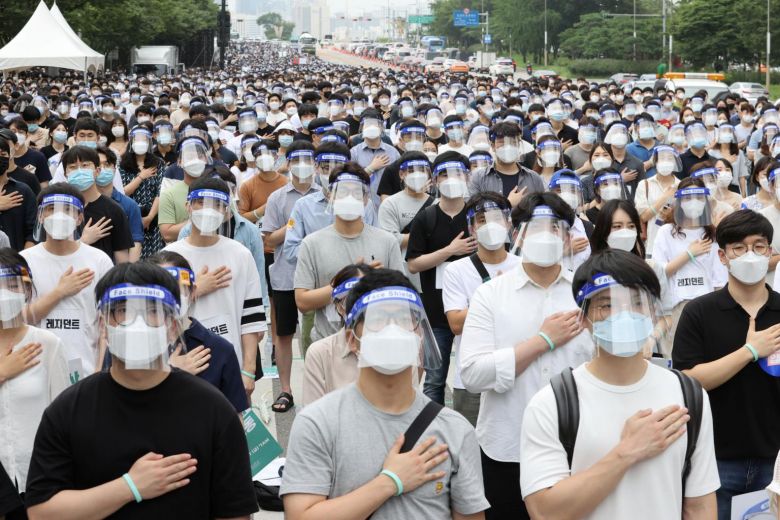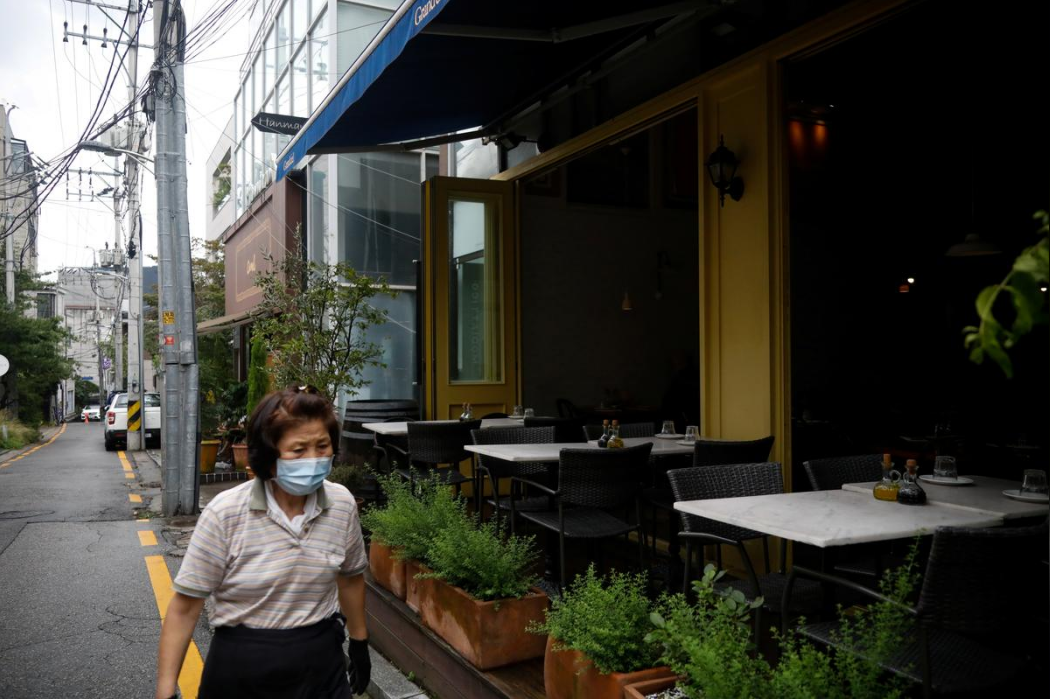
Medical residents protest a government plan to increase medical school admissions in Seoul, South Korea, August 7, 2020. /Reuters
Medical residents protest a government plan to increase medical school admissions in Seoul, South Korea, August 7, 2020. /Reuters
The South Korean government ramped up efforts to end a strike by thousands of the country's doctors on Friday, as Seoul took the unprecedented step of restricting eateries in the capital in a bid to blunt a surge in coronavirus cases.
Almost 16,000 intern and resident doctors have been on strike since August 21 over the government's plans to boost the number of doctors in the country over the coming decade, which it said is necessary to better prepare for public health crises.
The student doctors, however, argued that extra funding would be better spent improving the salaries of existing trainees, and addressing systemic issues.
Meanwhile, Seoul, South Korea's capital, recorded another 146 infections on Friday, raising the numbers of confirmed cases to 3,532 as of Friday, according to the Korea Centers for Disease Control and Prevention (KCDC) and the city government.
Virus cases in the capital have sharply spiked following cluster infections related to churches and a mass rally in central Seoul since August 15. Daily cases have mostly remained in the triple digits except for 97 on Sunday.
KCDC director Jeong Eun-kyeong warned that modelling indicates that if the outbreak is not contained, cases could surge to as much as 2,000 per day.
In response to the resurgence of the coronavirus in the capital, Park Yoo-mi, the city's director of public health, announced that it will be extending a ban on all rallies of 10 or more people for two weeks during a press briefing on Friday.
Coffee shops, some of which have been identified as hotspots in the outbreak, are restricted to takeout and delivery services. Restaurants, snack bars and bakeries are not allowed to offer on-site dining between the hours of 9 p.m. and 5 a.m.

An empty restaurant during a lunch hour amid the coronavirus pandemic in Seoul, South Korea, August 27, 2020. /Reuters
An empty restaurant during a lunch hour amid the coronavirus pandemic in Seoul, South Korea, August 27, 2020. /Reuters
Although the measure is stricter than the current Level II social distancing guidelines set for the whole country, government has been cautious about raising antivirus curbs to the top level due to the far-reaching impacts on the economy.
"Phase Three social distancing is the choice of last resort given the economic and social ripple effect," Prime Minister Chung Sye-kyun said during a government meeting.
Mixed feeling towards the strike
Thousands of teaching hospital doctors, trainee doctors and private practice physicians began a three-day strike on Wednesday to express solidarity with the intern and resident doctors.
But a recent opinion poll reported by Reuters showed that 58 percent of the 500 surveyed supported the government plan to increase the number of doctors.
The Health Ministry extended a back-to-work order for doctors to the entire country and filed a complaint with police against at least 10 doctors who, it said, have not abided by an order that has been in place in Seoul since Wednesday.
"We strongly denounce the government for filing complaint for criminal charges within just a day for refusing to comply with the order," Choi Dae-zip, president of the Korean Medical Association (KMA), which represents local doctors, said at a news conference in front of a Seoul police station.
Friday was the last day of the three-day strike organized by KMA, and the organization announced it has decided to launch an indefinite strike starting September 7, expressing disappointment over the complaint against the 10 trainee doctors.
"If our demands are not met, we will stage a general strike starting on the day indefinitely," Choi Dae-zip said.
The escalation in the dispute between doctors and the government came as South Korean officials grappled with a fresh wave of COVID-19 infections.
The intern and resident doctors form the backbone of healthcare services in key places such as emergency rooms and intensive care units, and major hospitals have reported delays and disruptions since the walkout. The striking doctors have volunteered their services at temporary testing centers to help with the outbreak.
"I understand the doctors, too, but now is not the time," Lim Soon-ja, 71, a thyroid cancer patient, told Reuters outside Seoul National University Hospital. "I wish they would express their opinions once the outbreak is settled."
(With input from agencies)